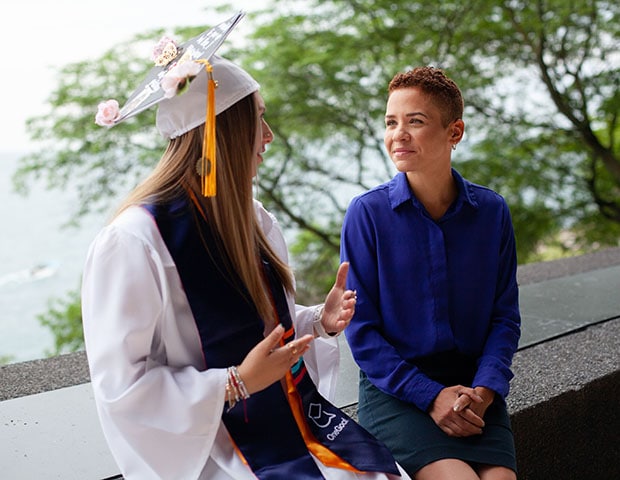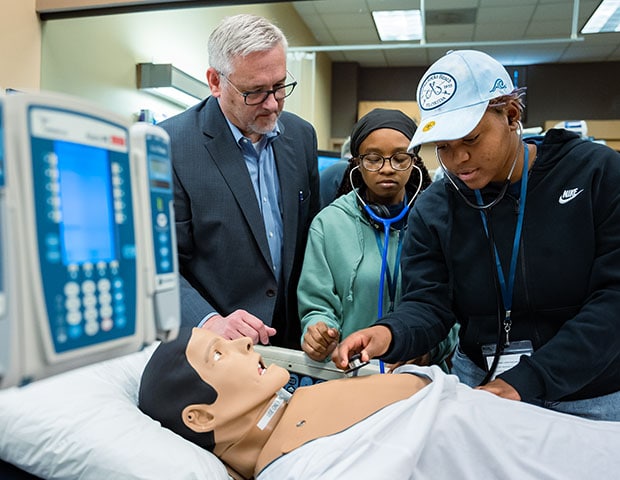OneGoal CEO Melissa Connelly delivered a thought-provoking speech at the 2023 NCAN National Conference. The following is an edited transcript of her remarks about the recent narrative around whether college is still worth it for students across the United States.
Beyond Degrees: Exploring Non-College Postsecondary Education
By Shelby Ward
February 2, 2024
In today’s rapidly changing educational landscape, traditional four-year college degrees are no longer the sole path to success. In this blog post, we’ll explore four alternative postsecondary options that offer promising routes to fulfilling careers and personal growth. From certificates and apprenticeships to industry certifications and licenses, these non-college pathways open up a world of opportunity for individuals of all backgrounds and aspirations. This guide will introduce exciting educational alternatives beyond the traditional four-year college.
Education is an ever-changing landscape. In recent years, the importance of non-degree postsecondary options, also known as vocational training, has been growing rapidly. As tuition rates at colleges and universities have increased, more students are exploring alternatives to a four-year degree. In this blog post, we will explore four alternative pathways that can lead to a fulfilling and lucrative career without the need to pursue a traditional college degree.
Certificates:
Unlocking Opportunities
Certificates are awarded by educational institutions, usually “in a career education field.” Certificates are usually available for skill-based and technical jobs. Many of these jobs are in high-demand fields such as healthcare, project management, and cyber security.
Certificates provide validation of knowledge and skills that can be used to obtain jobs or advance a career. Some high schools allow students to complete their certifications in conjunction with their high school courses. Earning a certificate allows students to begin a career with little to no cost. Many lucrative jobs can be obtained by receiving a certificate, such as real estate, automotive repair, and web development.
A certificate is a great option for students who are embarking on a progressive postsecondary pathway. Students can obtain a certificate related to their career and begin working in their desired field while pursuing a degree. Some colleges will give credit for a certificate towards a degree. After a student completes their degree, they can also pursue additional certificates to enhance their degree. Because certificates do not expire or require renewal, they are a great option for lifelong learning and career advancement.
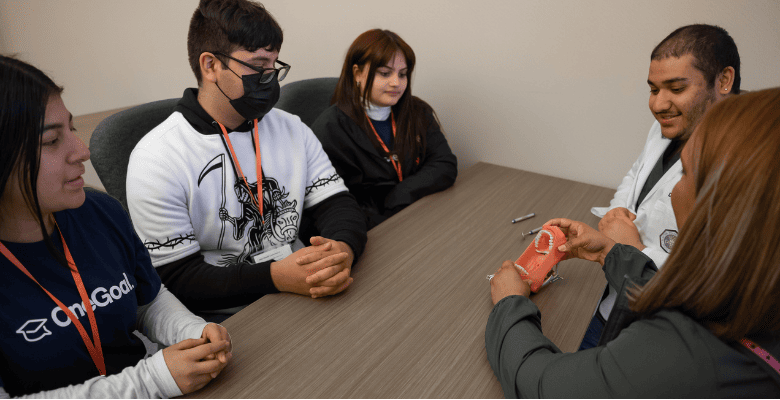
Apprenticeship Certificates:
Learning While Earning
One of the biggest hurdles facing students fresh out of high school is the financial strain of tuition and the loss of workable hours required to train for their chosen profession. For some students, taking time from work may not be an option, particularly students whose families rely on their income. A Registered Apprenticeship Program is an ideal option for these students as it allows them to get paid while earning their certifications.
What are the benefits of apprenticeship certificates?
Students who are working on their certification through an apprenticeship are paid for their labor while receiving hands-on training. Students are trained and better prepared to excel in their jobs while they are given the tools and knowledge necessary to work in highly lucrative careers. In fact, “93% of apprentices who complete a Registered Apprenticeship retain employment, with an average annual salary of $77,000.”
The federal government has standards that must be met by entities who are instituting an apprenticeship program.. Because apprenticeships are vetted and held to a standard, the certificate that students receive is a “portable [and] nationally-recognized credential.”

While earning money and a certificate may be the most appealing to students, there are many other benefits that students have access to as part of any recognized program. Programs are required to connect students with a mentor who can help them navigate their new career. A mentor can connect students with opportunities for personal and career growth in their chosen profession. In addition, students can also earn “academic credit towards a college degree for the skills [they] learn while avoiding student debt.” This can be a huge benefit for students who wish to gain a college degree but do not want to accrue debt.
Another great thing about apprenticeship programs is that the benefits are not just for the student. Businesses that implement an apprenticeship program also benefit. Apprenticeship programs “improve productivity, profitability, and the company’s bottom line” while also “reduc[ing] turnover, improv[ing] loyalty, and retain[ing] top talent.” In addition, there are often tax breaks available for businesses engaging in the Registered Apprenticeship Program.
Navigating Progressive Pathways Beyond College
Diego Reyes is a OneGoal student at Eric Solorio Academy High School in Chicago. He recently participated in a panel for a OneGoal webinar, “College is Not the Only Option: Exploring Progressive Pathways,” where he discussed his participation in an apprenticeship certification program. Beginning in his senior year of high school, Diego was able to attend an electrical training program sponsored by the International Brotherhood of Electrical Workers (IBEW). He joined a program called Chicago Builds. Through this program, Diego was able to learn how to do electrical work while he is still in high school. Once he completes this program, he will move into an apprenticeship where he will be paid for his time while finishing his certificate. Upon receiving his certificate, Diego will be able to transition to a new company anywhere in the United States. In addition, IBEW will pay for him to pursue further education. Diego plans to earn a Bachelor’s of Architecture. One day, Diego hopes to start a construction company. His advice to fellow students is to talk to their counselors and put themselves out there—meet people who are in careers that interest them and ask them about their
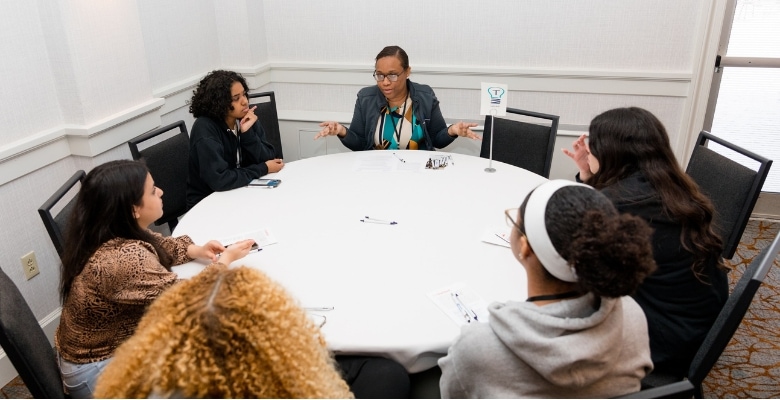
Industry Certifications:
Proving Your Expertise
Industry certifications are credentials that “measure competency in an occupation [and] validate the knowledge base and skills that show mastery in a particular industry.” They are awarded by certification bodies based on rigorous exams. Industry certifications allow students to have opportunities for more lucrative positions in their chosen career fields by “allow[ing] students to demonstrate mastery of knowledge and/or skills.”
There are many different industry certifications available to students, and some can be completed while still in high school. Students interested in IT can pursue their industry certifications through CompTIA and Cisco. Students can pursue a CPR and certified nurse aide (CNA) certification if they are interested in healthcare. A Project Management Professional (PMP) certification can prepare students to become project managers.
Unlike certificates, industry certifications do expire. However, they can be extended by going through a recertification process.
Licenses:
The Gateway to Regulated Professions
Some industries require occupational licenses in order to be employed. These include cosmetology, healthcare, law, and teaching. Licenses are based on predetermined criteria such as education, certifications, assessments, or work experience. For regulated professions, licenses provide an extra level of control to ensure high-quality workers. This extra measure is taken to ensure that these jobs are done with fidelity and to ensure safety of clientele.
The standards for licenses vary between industries, and different states have different requirements. Licenses often do not automatically transfer between states and may require retesting. Licenses also must be renewed periodically. Renewal standards are set by the state or other entities and may require additional education in the form of professional development as well as retesting.
OneGoal alum in New York, Makayla Ransom, saw vocational school as a stepping stone in her education and career journey. Makayla thoughtfully mapped an affordable, accessible path to a career in healthcare by enrolling in a vocational (non-degree) program that offers students hands-on training before joining the workforce.
The School of Cooperative Technical Education is a half-day program with in-person classes close to Makayla’s home and offered for free through funding from the New York City Department of Education. Makayla’s goal is to complete a certificate program before pursuing a Bachelor’s degree in nursing or seeking job placement among one of Co-Op Tech’s many vocational partners, “I don’t want my parents to go out and waste money, so I chose this pathway because I felt like it was better.”

Supporting Students on
Non-Degree Postsecondary Paths
Progressive and non-degree pathways present an excellent opportunity for students to achieve their postsecondary goals. However, many students do not understand the myriad of options available to them. It is vital that schools support students who may not desire a traditional postsecondary education.
Early Exposure and Education
A vital part of a student’s high school experience is deciding what career they want to pursue. Students must be given information about many career options in their college and career readiness programs during high school as early as possible. This will give the students a chance to explore their interests and prepare them for their postsecondary journey.
It is extra important that information about non-degree pathways be available to students early in their high school career. Many certificates or certifications can be obtained during a student’s junior and senior year through either the school or the local community. By allowing students to learn about their non-degree options earlier, schools enable students to take advantage of programs that allow them to graduate with expanded career opportunities.
Schools and teachers can integrate information about certificates, apprenticeships, industry certifications, and licenses into their curriculum. A biology class could include a discussion about becoming a phlebotomist. A math class could look at a career in coding or tax preparation. In social studies classes, teachers could discuss careers related to city planning or tourism. English teachers can showcase jobs related to the publishing industry.
Schools should also have up-to-date information about careers in the library or front office. The school could choose a specific career to showcase periodically and create a display that students can peruse. The school website should have a dedicated section on information about non-degree careers.
If there is a study hall class, then teachers can highlight a career and show students what they would need in order to pursue it. Teachers should encourage honest discussion with the students and ensure they understand that there is no one-size-fits-all approach to success.

Career Counseling and Guidance
Students need to have personalized career guidance. If possible, schools should invest in a comprehensive career counseling program with information on non-degree pathways. Schools could hire a specialist who is dedicated to providing career counseling.
Because there are more students than counselors, counselors will need help in order to effectively counsel students. Teachers and counselors can collaborate to identify students’ strengths and weaknesses to assist them in making informed decisions. Schools with a homeroom could ask teachers to meet with their students to discuss and document their interests and aspirations. If there is not a homeroom, then teachers could volunteer to check in with a small group of students. Schools should provide opportunities for teachers to meet with these students so as not increase teacher workload. Teachers should also have a way to document the conversations so that counselors can utilize the information in counseling sessions.
Students who are enrolled in the OneGoal three-year program are given many opportunities to meet with their Program Director. This gives them a chance to discuss their interests and aspirations with a trusted adult. The Program Director takes notes in order to better advise the student. The OneGoal curriculum also includes many activities that are designed to help students discover their interests and how they might lead to a career.
Guest Speakers and Industry Partnerships
A great way for schools to support students in non-degree pathways is to invite guest speakers to come to campus. They can share their valuable experiences and insights with students, helping them to learn about potential careers. In addition, students can make connections with people in various careers. This will facilitate entrance into non-degree programs. Schools can potentially use these connections to arrange for students to complete apprenticeship programs while still enrolled in school.
Schools and teachers play a pivotal role in empowering students to explore and succeed in non-degree postsecondary pathways. Together with community partners, schools can support students on their pathways. Teachers and counselors should encourage students and be willing to have discussions with students about their futures.
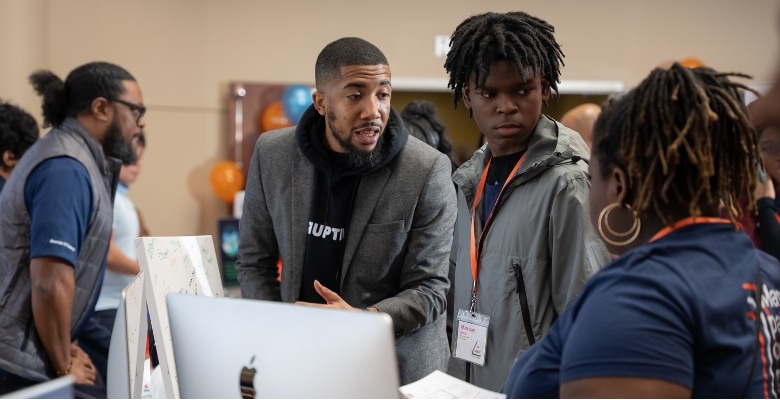
Navigating Non-College Pathways
for a Fulfilling Career Journey
Non-college pathways can lead to successful, rewarding, and lucrative careers. Parents, teachers, and other adults should support their students in exploring these careers with regards to their personal interests and career goals. Students must be encouraged to make informed decisions about their postsecondary education journey. As the education landscape continues to evolve, students have more diverse opportunities for growth and lifelong learning.
Shelby Ward was born and raised in Spokane, Washington. She received her BA in history teaching from Brigham Young University in Provo, Utah, where she had the opportunity to move to Houston for a three-month internship. Despite experiencing her first hurricane 10 days after moving in, Shelby never left and is now a OneGoal Program Director in Texas.

Related Stories
Non-degree education opportunities after high school through progressive pathways could lead to promising careers or provide a stepping stone to a degree pathway.
Sifting through postsecondary options can be overwhelming for students. The new Quality Enrollment Framework at OneGoal supports students in narrowing these options into a shortened “best fit” list.



